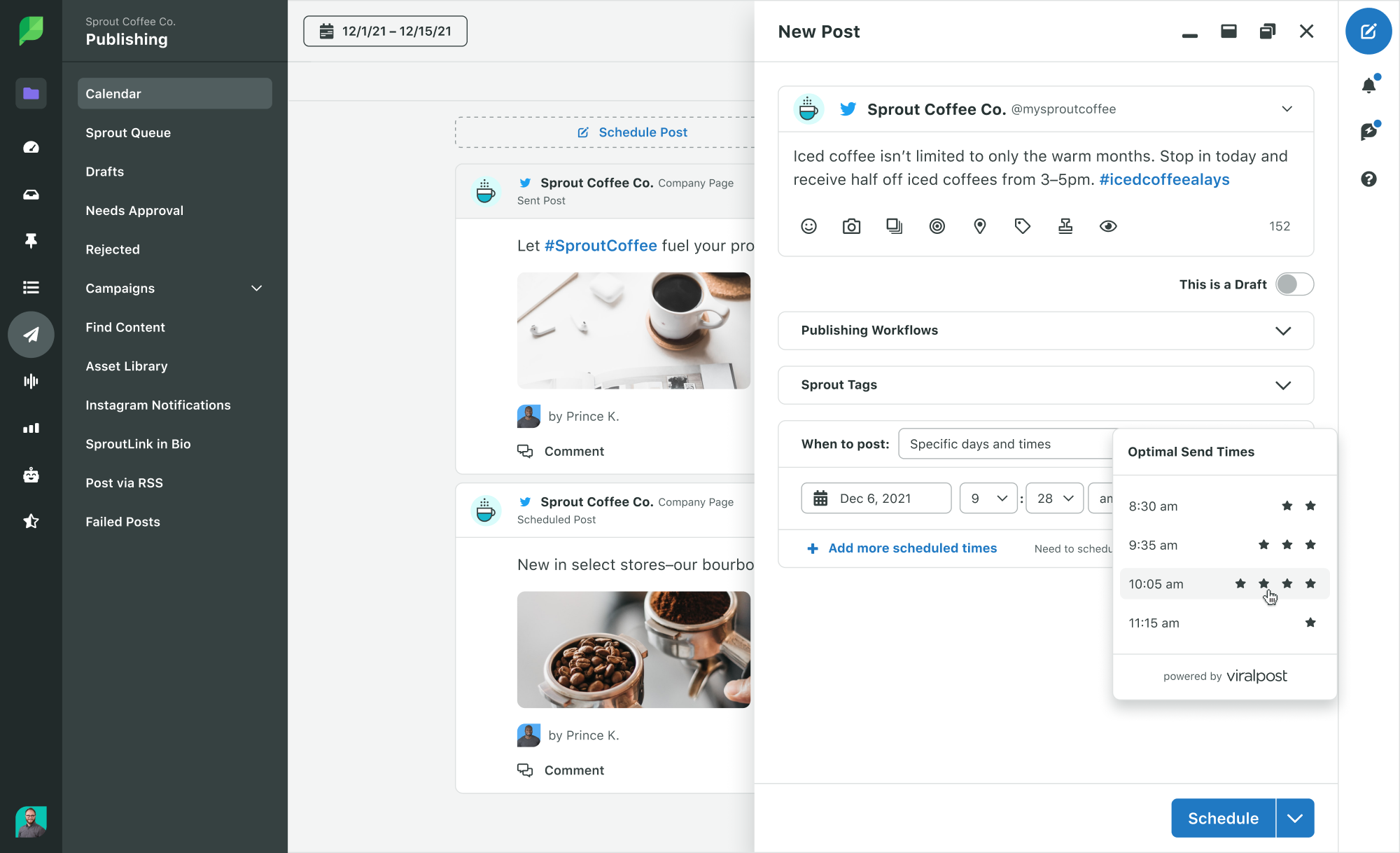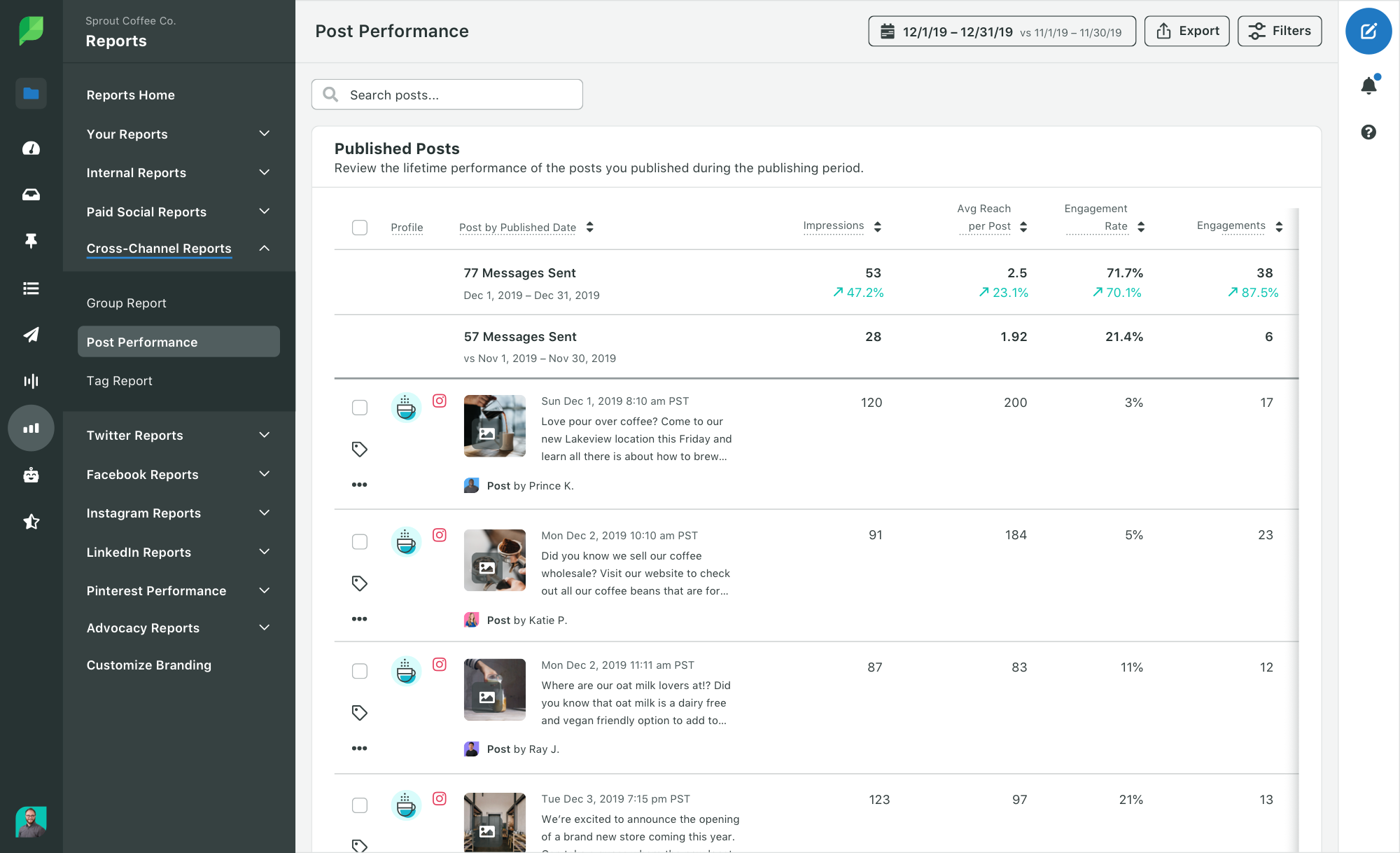Just like life, social media strategies have ups and downs. If you’ve been chugging along, outperforming benchmarks, garnering high engagement and reaching all your goals, but then hit a bump in the road, don’t panic. When your content or campaigns stall out, it’s time to put your thinking cap on.
There are a lot of reasons why you might not be seeing the return on your social content that you’d like. When you hit a plateau, it may be time to rethink your approach, look at your reports with fresh eyes, create tests, or make the case for new and different content.
Consider what might have changed
One thing every marketer knows is that things are always changing on social media. New trends emerge every second, consumer needs evolve with the times and social media platforms change their features, algorithms or other standards. It can be difficult to keep up, but if you noticed a plateau or dip in followers, impressions, engagement or other metrics you use to measure success, it’s important that your strategy accounts for any changes that have taken effect. Here are a couple of questions to ask yourself if you’re looking to reinvigorate your followers:
Are you checking your demographics?
Social media practitioners are hyper-focused on understanding their audience, but if you’re not using data to confirm who your audience actually is, it’s difficult to craft effective content.
For example, if you’re tailoring your Tweets for a Gen Z audience, but the majority of your followers are actually 35-44, it’s time to mix up your messaging. Or perhaps, your audience is made up of mostly women, but your goal is to engage with a more gender-diverse crowd. Having a better grasp on your demographics and marketing personas, and how they evolve, can help revamp your strategy.
Are you publishing content at the right time of day?
If engagement or simply getting eyeballs on your content has been a challenge lately, knowing when to post might help. In addition to Sprout’s comprehensive list of the best times to post, our ViralPost® technology takes the guesswork out of scheduling by automatically calculating the optimal send times for your content.

Have any social platforms recently changed their algorithms?
If you’re not seeing the engagement you’re used to, or your followers took a dive overnight, you might not be alone. Social platforms make changes to their algorithms and standards frequently which can change how paid and organic content are prioritized in your target audience’s feed. Now, on nearly all platforms, chronology has fallen by the wayside and relevancy is king.
We have not made any recent changes to feed ranking, and we never hide posts from people you're following – if you keep scrolling, you will see them all. Again, your feed is personalized to you and evolves over time based on how you use Instagram.✌️
— Instagram (@instagram) January 22, 2019
A lot of platforms will update users about these changes, but it’s not always immediately clear how marketers can crack through the algorithm. When Facebook announced that it was making changes so personal moments don’t get lost in the noise created by brands and businesses, it became clear that marketers would need to prioritize content that leads us to connect more with one another.
Even if a social media platform doesn’t come right out and give you the keys to the algorithm changes, it’s clear that relevance is important, but so are authenticity and human connection. There’s no surefire way to make sure your posts are at the top of every feed, but you can create content that is hyper-relevant and tailored to your target audience.
Is it just a sign of the times?
During COVID-19 consumer behavior has changed dramatically, which is a common occurrence during national or global crises. The same was true following 9/11, the 2008 recession, etc. In those instances when tensions and emotions run high, your content might not resonate in the same way.
If your audience has disengaged, think critically about how current events might be affecting them and what content they might be sensitive to. When life throws curveballs, human connection is the most valuable thing a brand can offer its community.
That's why we're offering 30-minute one-on-one consultations with our shop managers to help discover the best products for your skin, hair and body, along with tips on how to use them for best results.
— Lush North America (@lushcosmetics) April 17, 2020
While you might want to find ways to immediately improve those KPIs, instead focus on one-to-one engagement and building real relationships with your followers that will last into the new normal—whatever that means.
Social data tells a story
When you’ve hit a plateau, your month-over-month changes are stagnant, you’ve lost followers, website traffic has stalled or whatever the case may be, your social data tells a story that will help answer why and how to bounce back.
Take a look back at your reports and try to pinpoint specific moments where your content didn’t perform as you’d hoped and where it outperformed your expectations. Sprout’s reports visualize activity in a digestible way that makes peaks and valleys easy to spot.

On the days where you notice peaks, hone in on what content or campaign was fueling that fire. Dig deeper in Post Performance Reports, which break down each post’s impressions, reach, engagements, engagement rate and more. Sort your messages by the metric that’s your top goal and compare the most successful content to the low performers.

What worked for those top posts? Did the lower-performing posts lack a strong CTA? How do the language and creative elements compare? What feedback did your audience give on those posts? Ask yourselves these questions and apply your findings to your next wave of content.
Listen to stay ahead of the curve
Listening to your audience is always important, especially when you’re noticing a dip in your KPIs. According to the Sprout Social Index: Empower and Elevate, 43% percent of all social marketers say a major challenge is identifying and understanding their target audience. Creating content that supports your goals is pretty tough when you don’t understand who you’re talking to. To address this concern, marketers should turn to social listening.
Social listening tools analyze trends in overall discussion about your brand, industry, competitors and more. If you’re struggling to understand what your audience really wants, this can show you what they are talking about, sentiment, keywords and trending topics. Tapping into those conversations is a great way to get a sense of how you can tailor your content to the specific wants and needs of your audience. If you’re already sold on the value of listening, download this cheat sheet to build a listening strategy.
Make a case for using paid ads
If you’re struggling to reach your target audiences through organic social posts, it might be time to introduce a paid strategy. On Facebook, organic posts only reach about 6.4% of your followers so it’s easy to get lost in the noise. Paid social can help brands to break through and connect with audiences that might have missed out on their content otherwise.
If you’re not ready for a full-blown paid strategy, boosting is a cost-efficient way to dip your toes in the paid pool. “If you have an organic post that’s working really well, you don’t even need to create a new ad. You can just put $50 behind it and see how reaching a wider audience impacts your goals and hypotheses,” said Shelby Cunningham, Sprout’s Digital Marketing Lead, in a recent interview. With a little boost, your content could see big gains.
Get creative
If you’ve exhausted yourself trying to think of ways to repurpose your content or reinvigorate your strategy, it might be time to try something new. Creative testing can help your brand enhance ad campaigns before they launch, create more impactful creative assets and understand which concepts your audience is loving and which they aren’t.
If your company gives you a bit of freedom to explore new creative avenues, go for it!
Have you been wanting to dip into video? Try it out! Not everything needs to be Oscar-worthy to be engaging.
Use GIFs in your Tweets to entertain your followers.
Try capitalizing on cultural engagement opportunities that are relevant to your brand, like Gillete’s stay-home style timeline or MoonPie’s response to the first supermoon of the year.
You vs. the moon she told you not to worry about https://t.co/FN4WacuT44
— MoonPie (@MoonPie) March 9, 2020
If Instagram is a major part of your strategy, consider incorporating more carousel posts into your feed. Carousels lead to high engagement across all industries because they get re-served to users who don’t engage the first time. As a result, they earn more impressions and opportunities for engagement than a standard post.
If you want to know what kind of content your audience wants to see more of, sometimes it’s best to just ask. Post community questions or use polls in Instagram Stories, Twitter, Facebook and other social platforms to drum up new content ideas.
If you could tweet for us, what would you say?
— Stouffer’s (@stouffers) April 14, 2020
Keep your head up when your data is down
As a social media practitioner, it’s easy to get emotionally invested in your strategy, wrapped up in your social data and begin equating KPIs to your own personal success. It’s important to remind yourself that social media is fickle and a tricky thing to master.
Month-over-month comparisons of raw data don’t tell the full story. If you’re feeling down when you see a drop in impressions, followers or other metrics take a look back at how far you’ve come. Celebrate your successes. If you put a lot of work into a campaign that didn’t convert as expected, that doesn’t mean you are a failure. Rather than internalize that, focus on what you can learn from that experience.
i remember thinking “no way i’ll ever top this viral thread” 1.5 years ago but somehow the steak stars aligned again. i’m simultaneously grateful for the outcome and troubled at myself for perpetuating the personification of a meat corporation
save me, cognitive dissonance https://t.co/As8lmVudgY
— Nathan Allebach (@nathanallebach) April 9, 2020
Trends might emerge overnight, but a strong strategy and flawlessly functioning team do not. If you’ve recently restructured and your social media team has either shrunk or grown, be patient as you adjust.
If you’re flat out feeling overwhelmed, you’re not alone. Taking care of your mental health while working in social media can be challenging when it feels like you have to constantly be plugged in. Consider reaching out to other social marketers directly or joining an online community where you can ask how others have dealt with mental stress or burnout.
Times change, people change and social media data, trends and platforms definitely change. When that affects your content, look at it as an opportunity for professional growth. With a little investigating, some fresh content and a pivot to your approach, you can jumpstart your metrics and get them moving in the right direction.
This post What to do when your content stalls originally appeared on Sprout Social.
Read more: sproutsocial.com
